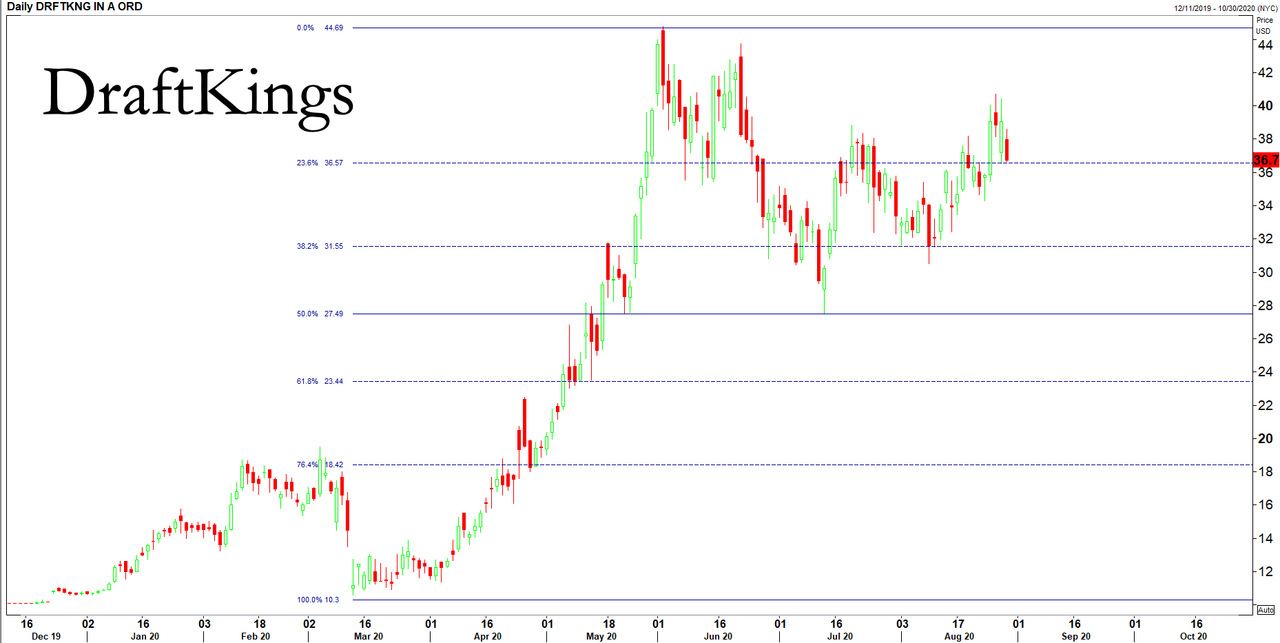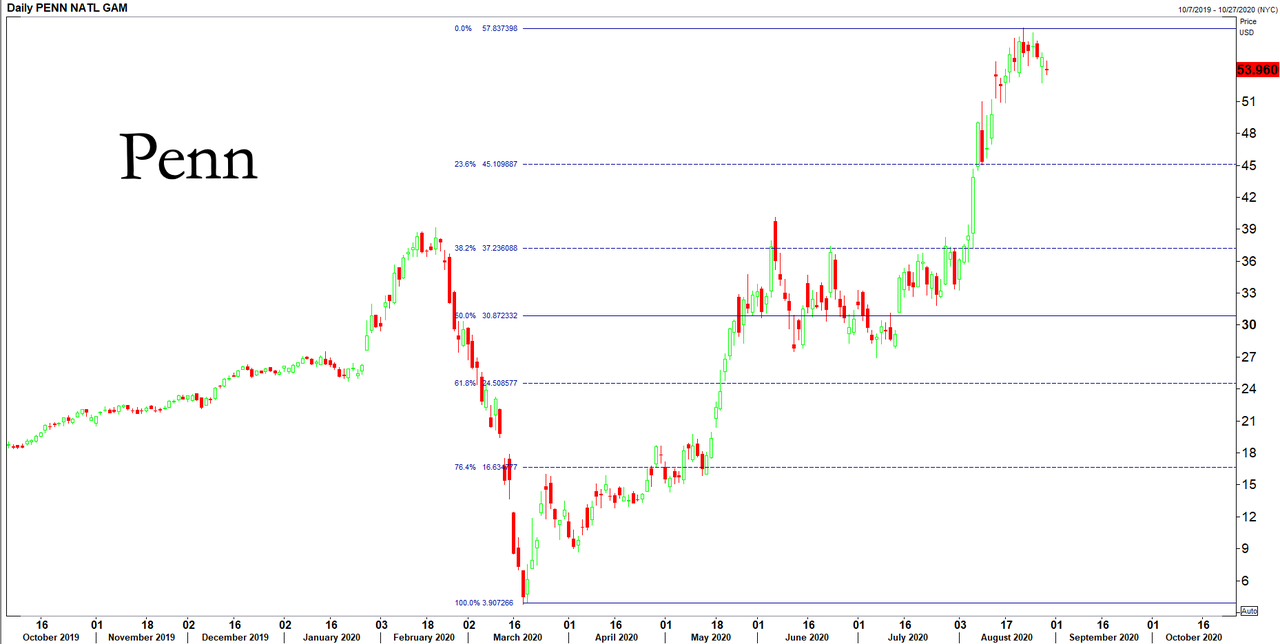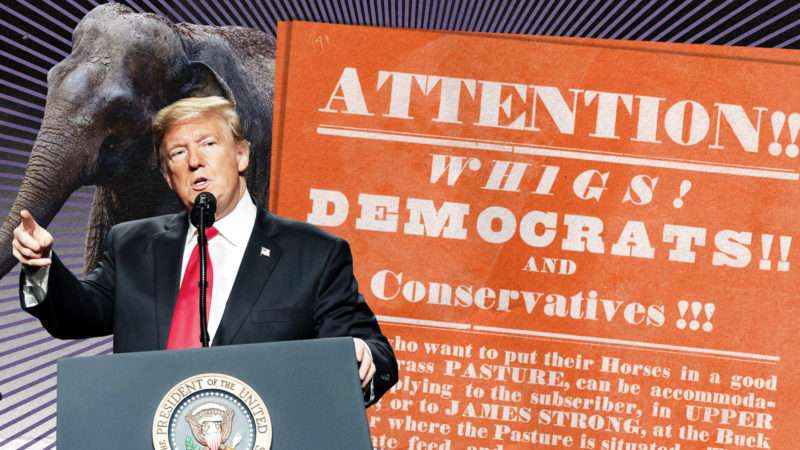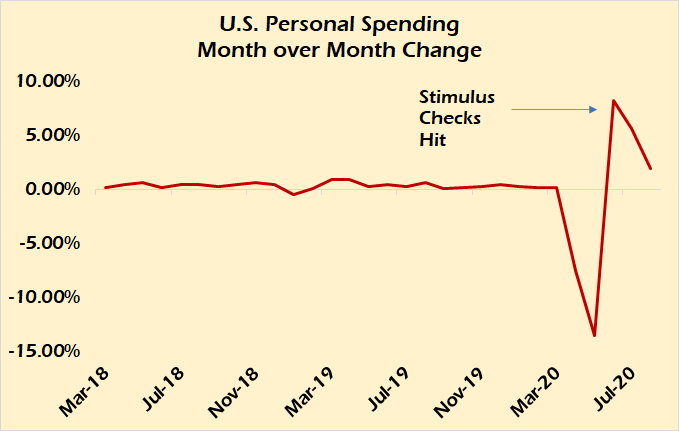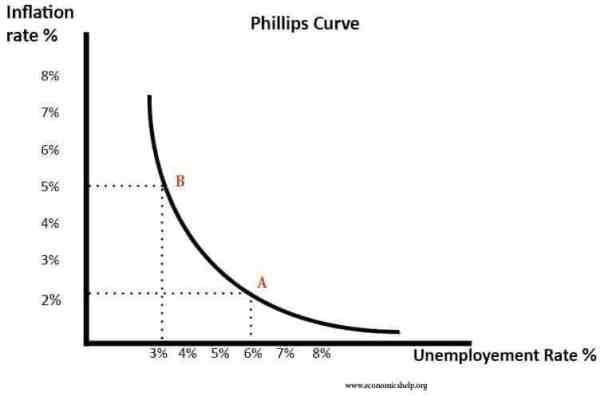Donald Trump, who four short years ago was viewed by many GOP operatives as an erratic outsider, has just been re-nominated as the Republican Party’s standard-bearer. But whether he wins or loses, can a party without any guiding principles survive?
How do old political parties die, and how are new ones born?
Imagine a political party that has lost its ideological coherence and is torn apart by various warring factions. Then an outsider and celebrity candidate emerges with no fealty to the party’s policy agenda and with no previous political experience. He goes on to connect with voters and retake the White House.
That’s exactly what happened in 1848, when the Whigs backed Zachary Taylor.
Political scientist Philip Wallach, a resident senior fellow at the R Street Institute, published a 2017 paper on the parallels between Taylor and Trump.
“Taylor was a very disruptive force for the Whig Party,” says Wallach. “His victory was, of course, something they were very excited about, but he didn’t govern in exactly the ways they would have preferred.”
While Trump raised his profile by projecting a bellicose demeanor on primetime television, Taylor was a celebrated general who won a key battle in the Mexican-American War. And like Trump, he tried to redefine his party in his own image and refused to pledge fealty to party principles.
Taylor “even thought about rebranding [Whiggism] as ‘Taylor Republicanism,'” says Wallach.
But Taylor’s efforts at redefining Whig principles were doomed by a preexisting divide over whether slavery would be allowed in new territories. Both the Whigs and their primary competitors, the Democrats, waffled, which created an opening for single-issue third-parties such as the anti-slavery Liberty Party and Free Soil Party, as well as the nativist Know-Nothing Party.
After Taylor’s untimely death in office, the fractured Whig Party “bled to death,” as historian Michael Holt put it, losing too many voters to the Free Soil and Know-Nothing parties. And out of that carnage rose the Republican Party, united by the conviction that slavery should have no part in America’s future.
What does the death of the Whigs tell us about the prospect of breaking up our modern two-party duopoly?
“In 2020, we have two parties that have delivered us candidates, both of which are more destructive than they are constructive,” says evolutionary biologist and podcast host Bret Weinstein, who is trying to engineer the candidacy of an independent to go up against Biden and Trump.
Weinstein sees a parallel with the mid-19th century in that voters are again open to alternatives.
“This is, in some sense, the natural outgrowth of the fact that the parties long ago stopped serving the interests of the American public,” says Weinstein.
Weinstein, who’s best known for his viral confrontation with student protesters at The Evergreen State College after he objected to a call for all white people to leave campus for a day, believes that the two major parties are in thrall to far-left and far-right fringes and elite donors, causing them to neglect a majority of Americans.
“For many reasons, the natural thing is for Americans to unify under some banner in order to regain power over the policymaking structure,” says Weinstein.
Weinstein launched an initiative called Unity 2020, which intends to use online crowdsourcing to nominate a center-left and center-right candidate to run and govern as a team. He says by circumventing the usual political process, candidates will avoid being so easily corrupted.
“We have all been told that power tends to corrupt and absolute power corrupts absolutely,” says Weinstein. “I have long thought this is nonsense. What we do have is a system in which power tends to be awarded to people on the basis that they are corruptible.”
But in the 19th century, there were fewer obstacles to challenging the major parties.
“For a third party to be able to get some votes was much easier,” says Wallach. “It just had to be able to print ballots and distribute them to a network of supporters….Nineteenth-century politics were just much more open and fluid than our politics today.”
With the election less than two and a half months away, whoever’s nominated by the Unity 2020 ticket is unlikely to make it on many ballots, and Weinstein declined to articulate a plausible path to victory.
“We are certainly too late with respect to the standard process of collecting signatures to get on the ballots of all 50 states, but that’s not the only way this can be accomplished,” says Weinstein.
The Libertarian Party’s presidential nominee, Jo Jorgensen, is on track to getting on the ballot in all 50 states, and she says she offers a better path forward than either Trump or Biden.
“People are realizing that they don’t have the choices that they used to have. And I think they’re getting fed up with government telling them at every turn what they can do,” says Jorgensen.
But Wallach is skeptical that a third party can disrupt our modern duopoly.
In the 19th century, minor parties like the Free Soilers won local and state elections and congressional seats, which the Libertarian Party has mostly failed to achieve. In 2016, after getting more attention than any Libertarian candidate in history, former New Mexico Governor Gary Johnson won just over 3 percent of the popular vote when going up against Trump and Clinton, two historically unpopular candidates.
A third party or independent candidate has never triumphed in a modern presidential election, with the strongest contender being former President Teddy Roosevelt’s 1912 campaign under the Progressive Party banner. The self-funded billionaire Ross Perot’s run in 1992 eventually spun off the Reform Party, which never won a national election but did become the site of Donald Trump’s first foray into presidential politics.
“That leaves us wondering, where would [a successful] a third party come from?” says Wallach.
He believes that, based on the death of the Whigs, to be successful the Libertarian Party would need to win in statewide races and then merge with defectors from a collapsed Democratic or Republican Party.
But Weinstein is betting that digital media have opened new channels for a Unity ticket to bypass traditional gatekeepers, as outsider candidate Andrew Yang did in the Democratic primary.
“Andrew Yang would potentially not have gained our attention had it not been for this alternative media network,” says Weinstein. “He certainly rose spectacularly in the public imagination at the point he showed up on Joe Rogan’s ….There is something of similar or greater magnitude to the major networks that are operating under a different set of rules.”
And while there’s no single issue dividing the nation that’s on par with slavery in the time of the Whigs, Weinstein does see historical parallels.
“We are dealing with the very same issue in a different form in 2020. The thing that caused the civil war is simply not fully resolved,” says Weinstein.
While Weinstein is supportive of some aims of the Black Lives Matter movement, he believes its emphasis on racial identity foments dangerous divisions—for different reasons, but in similar ways, as racist movements on the far right.
“We are now seeing a movement that wishes to place race back at the forefront of our political thinking and, frighteningly, that viewpoint seems to be shared by those on the far left and the far right,” says Weinstein. “We cannot remain cohesive as a nation if we are attacking each other on the basis. That the only thing we need to understand to know what team we are on is the color of our skin or our gender.”
Jorgensen believes it’s government intervention that exacerbates many of our divisions, including racial ones, pointing to the Rosa Parks story as a historical example.
“A rural black woman stood up and refused to sit in the back of the bus,” says Jorgensen. “That was a government-run, government-owned bus. And so it was the government who was putting us in this ‘us versus them’ situation.”
While their strategies and analyses differ, Weinstein and Jorgensen both agree that the status quo cannot hold.
“I’d say everything is at stake in this particular election. And what we’ve been delivered is two different failure modes,” says Weinstein. “I think the problem is either case is unacceptable. And when one finds that situation, we have to look for a third way. And in this case, if it’s considered radical, so be it. It’s simply time.”
Jorgensen says that Americans feel fundamentally disempowered by the infringements on their liberties that a poor federal response to the COVID-19 pandemic has caused.
“Americans are frustrated because they don’t have any control over their own lives,” says Jorgensen. “And all they know is that it’s the two old parties that are making them feel this way.”
Produced by Zach Weissmueller. Opening graphic by Lex Villena.
Music by Stanley Gurvich licensed by Artlist.
Photo credits: CNP/AdMedia/Newscom; DNC via Sipa USA/Newscom; Tetra Images Tetra Images/Newscom; Tom Williams/CQ Roll Call/Newscom ; Bill Clark/CQ Roll Call/Newscom; Leah Millis/Reuters/Newscom; Leslie Spurlock/ZUMA Press/Newscom; Jeremy Hogan/ZUMA Press/Newscom; Antonio Perez/TNS/Newscom; Nuri Vallbona/Reuters/Newscom; Leah Millis/Reuters/Newscom; Stanton Sharpe/SOPA Images/Sip/Newscom; Gary I. Rothstein/UPI/Newscom; David R. Frazier/DanitaDelimont.com “Danita Delimont Photography”/Newscom

from Latest – Reason.com https://ift.tt/2Er2Cp5
via IFTTT
